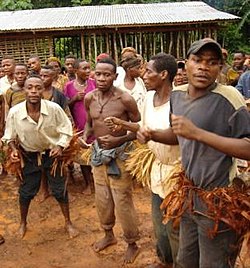Biography


Baka Beyond began in 1992, when vocalist Su Hart and her partner – guitar, mandolin and bouzouki player Martin Cradick (formerly of the group Outback) travelled to south-east Cameroon to live with the Baka tribe (hunter-gatherer Pygmies) in the rainforest and record their music. [1] The band was inspired by the Baka, [2] "one of the oldest and most sensitive musical cultures on earth". [3] Su Hart said "It was the amazing bird-like singing or yelli that first attracted me, ... The women get together before the dawn to sing, enchant the animals of the forest and ensure that the men's hunting will be successful. Song and dance are used by the Baka for healing, for rituals, for keeping the community together and also for pure fun." [2] [4]
In the early days of the band, Baka Beyond was made up of English musicians who aimed to re-create the sound recorded with the Baka people and integrate it into their own music. Joined by Breton fiddler Paddy Le Mercier, Cradick and Hart recorded two albums with musicians from the Baka tribe: Spirit of the Forest, released in 1994; and The Meeting Pool , released in October 1995. The group continued to evolve into a touring ensemble with the addition of Senegalese percussionist Sagar N'Gom, an ex-member of Outback; keyboardist Tom Green, formerly of the Orb; drummer Sam Pope; bassist Marcus Pinto; and vocalist Kate (Budd) Hardy. Baka Beyond's 1998 album, Journey Beyond, was a more heavily produced project featuring guests including percussionists from the Ghanaian band Kakasitsi. [1] The international nature of the band eventually grew to include musicians from Senegal, Brittany, Sierra Leone, Congo and Ghana as well as Cameroon and Britain. [5]
The relationship with the Baka themselves has grown with regular return visits keeping the band's inspiration strong. [2] [6] Over twenty years Martin Cradick and other members of the band travelled back to the rainforest to record music with the Baka people. They have recorded many albums containing a mix of music and sounds directly recorded from the rainforest, and music recorded by the band, which always shows a strong influence from Baka music. The band touring all the world (the Czech Republic, Spain, France, Portugal, Greece and Britain), Baka Beyond have played at WOMAD and Glastonbury, as well as headlining the Vancouver Folk-Roots Festival. Their tracks are often heard on TV soundtracks, particularly in nature programmes, and have been nominated for the BBC Radio 3 World Music listeners' awards. [4] [7]
Baka Beyond often perform with Rinky Dink, a mobile musical sound system that operates on power provided by two bicycles and solar panels.
